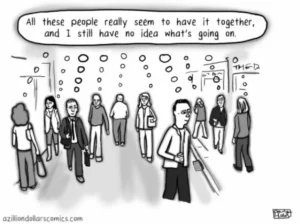“If they only knew … I am a total fraud and everyone is about to find out.”
If you have ever felt this way, you are familiar with imposter syndrome — that gnawing feeling of self-doubt and incompetence coupled with the dread of being exposed as a fraud.
People with imposter syndrome feel inauthentic, question their ability to be successful and are convinced that they do not belong in the roles they hold, even when they experience success. Women are especially vulnerable to imposter syndrome, though I know a number of wildly successful men who suffer from it too. As a male patient once commented during a session: “When are they going to pull the curtain back and realize that I just got lucky?” He had just made partner at a highly competitive New York City law firm and was in his early forties. “Unworthy” was the adjective he used to describe himself.
There is evidence that men and women experience imposter syndrome differently — men who feel like imposters have more anxiety when they receive negative feedback and as a result, exert less effort, whereas women who feel like imposters do the opposite. Both live in constant fear of being “discovered” and, rather than proud or accomplished, feel undeserving of the recognition or respect they receive.

Source: UC Davis BioScope
Here are 5 ways to stop imposter syndrome in its tracks:
1 – Trust the process
Instead of listening to the negative voice in your head, listen to the feedback you get from others. Odds are, your boss isn’t “being nice” when she gives you an excellent evaluation or recommends you for a promotion. Other people tend to be more objective than we are with ourselves. As psychologist Adam Grant observed:


2 – Channel your inner Sherlock Holmes
When self-doubt creeps in, do some detective work. Gather evidence. Consider objective measures. Remind yourself of what you have accomplished. Think of someone’s life you have touched or someone else’s career you have positively impacted. Concrete examples will help you stop underestimating yourself and recognize that other people aren’t overestimating you.
3 – Look backwards
Imposter syndrome tends to kick in when we become hyper-focused on challenges that lie ahead. Instead of listening to the negatively skewed chatter in your head about what you cannot do in the future, consider the past. At a recent awards event, model and designer Gigi Hadid explained how she uses this technique to overcome self-doubt. “Now in the times where I feel like I have imposter syndrome I think back to learning from every season and tell myself ‘it will get better and you’ll be more proud of yourself.'” Hadid credits Tommy Hilfiger for helping her overcome imposter syndrome.
4 – Make a list
A technique that psychologist Suzanne Imes (who actually coined the term “imposter syndrome”) uses with her clients involves making a list with three columns: the first, of the things they’re not so good at; the second, of things they’re OK at; and the third with things they’re very good at. Reminders of accomplishments and connections will reduce self-doubt.
5 – Reframe it as a strength
Those with imposter syndrome are more likely to say “I don’t know” when they don’t know. This is an advantage. Overconfident people assume they have all the answers, even when they don’t. Humility, uncertainty, and self-doubt are part of the learning process. The key is to believe in your ability to learn.
I experienced imposter syndrome first hand when I graduated from medical school. As a young intern on the wards, I was convinced there had been a mistake. How on earth did they let me graduate and take care of sick people who needed a “real” doctor with far more experience. It took a few weeks and a wonderful chief resident to remind me that I was up to the task.
My secret weapon was a handwritten note a patient sent me after she had left the hospital, thanking me for taking good care of her. I kept the pale pink notecard in a pocket of my doctor’s coat for months. Whenever imposter syndrome reared its ugly head, I would reach for it. Over time, it frayed and crumpled and a coffee spill made some of the words illegible. But it didn’t matter. I had memorized them by then and just knowing it was there made all the difference.
I wish you all the best,
Dr. Samantha Boardman






